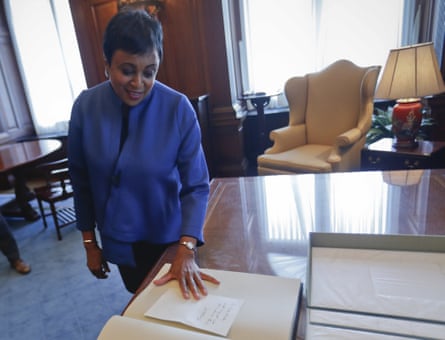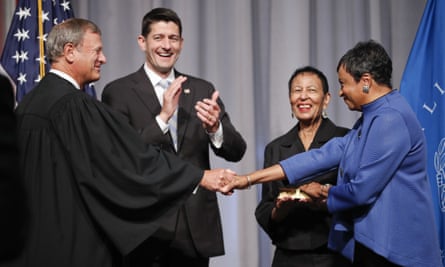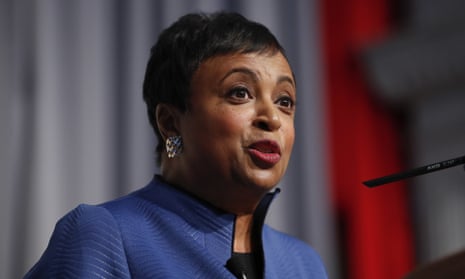Carla Hayden made history when she was sworn in as the United States’ 14th librarian of Congress on Wednesday. Unlike her 13 predecessors, all of whom have been white men, Hayden is an African American woman.
“Even though librarianship is one of the four what they call feminized professions – social work, education nursing, and librarianship – where 85% of the workforce is female, there haven’t been an equal amount of women in the leadership positions,” Hayden said in an interview.
Hayden is also only the third Librarian of Congress to actually have training as a librarian.
“There have been lawyers and politicians, historians, scholars, librarians, and I think at this time it’s not a detriment to have a librarian be librarian of Congress,” she said.
The librarian of Congress oversees the world’s largest library system. As the name indicates, one of the main roles of the library is to assist Congress in the research it needs in order to pass bills. It also oversees the US copyright system, names the poet laureate, and preserves historical documents and books.
“Dr Hayden has devoted her career to modernizing libraries so that everyone can participate in today’s digital culture,” Barack Obama said when he nominated her.

Hayden says she would like to digitize as many items as possible, especially the rare collections, so people would not have to come to Washington DC to experience them. But she says the internet is not enough.
“People still need assistance when they get information on the internet,” she said.
“We’re the original search engines and we held people find things to make their lives better,” she said of librarians.
According to Hayden, the profession was “feminized” when Melvil Dewey, who created the Dewey decimal system, said “it was time to let women in because there was a lot of monotonous work to do. And he also said women in public libraries could be hostesses because they were part of the home”.
“Oh he was quite the fellow,” Hayden said, laughing. “So for a woman to be actual manager, CEO, is poetic justice.”
Hayden says she’s even more proud of her role as the first African American Librarian of Congress.
“I’ve talked for years and cited how slaves were forbidden to read, you could get your hand chopped off, or people who taught slaves to read were punished, that’s Fredrick Douglass’s thing,” Hayden said. “So to have an African American heading up the world’s largest library is not quite an oxymoron, but it speaks to the history.”
Growing up, Hayden’s love of reading was inspired by Marguerite De Angeli’s Bright April, about a young African American girl in the Brownies.
“I thought she looked like me too – so I loved that book,” she said.
In high school, Hayden developed a taste for British history and says she knew everything possible about Anne Boleyn, the second wife of King Henry VIII. She also loves “cozy mysteries” and considers herself something of an Anglophile.
She loved libraries but didn’t even consider it as a career until after she had graduated from college and began to work at Chicago Public libraries.
She eventually got advanced degrees and took a professorship in Pittsburgh, but left it to return to the Chicago Public Library as the children’s librarian. While she was in Chicago, she met Michelle Obama, who was Michelle Robinson at the time, and though the two didn’t stay in close contact over the years, Hayden does sometimes marvel at the fact that their “professional lives would merge again in this way”.
“That’s something,” she said, grinning with a robust sense of wonder.
Hayden first came to national prominence in 2003 when she spoke out against certain elements of the Patriot Act as the head of the American Library Association. Attorney general John Ashcroft attacked Hayden for sowing “hysteria” about the provision of the act that would allow the government to search library and bookstore records.
Hayden shot back.
“We are deeply concerned that the attorney general should be so openly contemptuous of those who seek to defend our Constitution,” she said. “Rather than ask the nation’s librarians and Americans nationwide to ‘just trust him,’ Ashcroft could allay concerns by releasing aggregate information about the number of libraries visited using the expanded powers created by the USA Patriot Act.”
At the time, there was political risk in such statements, but Hayden said she never considered that.

“It wasn’t an either or – it was a how do we do both. How do ensure national security and protect a person’s right to know,” she said. “What was happening at that time was people wanted to know what are these groups [like Al Qaeda and the Taliban], a lot of people didn’t know what jihad meant or anything like that and they were seeking information and the concern was just because you want to know, you don’t intend to do anything. You just want to know.”
Hayden was the head of Baltimore’s library system since 1993 until she resigned earlier this year, after her nomination. When unrest erupted in the city after the death of Freddie Gray, a young black man who died in police custody, Hayden kept the libraries open, even though almost everything else was closed.
“My thinking was that at a time of crisis the library should try to be open,” she said. “And it was heartening that the staff members were willing.”
She tells the story of one young man who was there the morning after the riots to fill out job applications. When he returned two days later to tell her he had three interviews “it really reinforced the fact that the community needed us open”, she said.
When her predecessor James Billington retired in 2015, Hayden was initially part of the group searching for his successor. “I was in that pool of consultants and then I was asked after a while would you consider being a candidate,” she said. “That was something to go from consultant to candidate.”

Comments (…)
Sign in or create your Guardian account to join the discussion